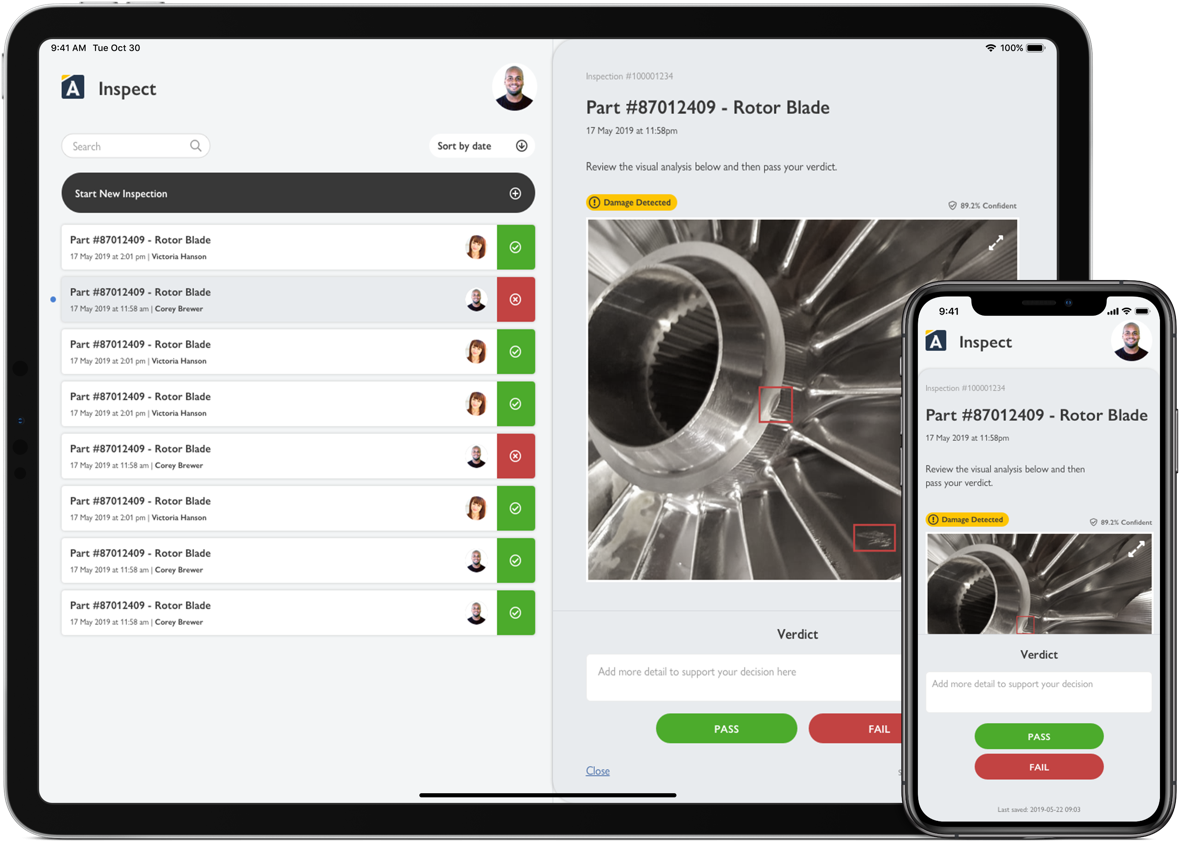
A new tech startup is seeking to improve the speed and accuracy of aircraft part inspections through its artificial intelligence (AI)-based software. As one of 10 startups selected for the inaugural ATI Boeing Accelerator program, Anomalous will be spending the next three months within the accelerator building up its product and team before pitching to aviation industry customers, stakeholders and investors.
According to Anomalous, humans performing visual inspections are typically poor at consistency and research shows that inspectors miss between 20-30% of visible defects on average. The company’s software has been built to augment the process through the use of AI, which Anomalous believes will help inspectors perform their jobs better.
“Our software helps inspection and maintenance teams find problems in any number of aircraft parts, from fan blades to other key engine components,” explains Euan Wielewski, co-founder and CEO, Anomalous. “The use of AI can make inspection faster and more accurate—an advantage that can save money, and even lives.”
Using the software, inspectors first capture data about a part—typically from an image or video of the part recorded on devices such as tablets or ultrasound scanners. Anomalous’s software then uses AI models to analyze the part and look for defects, producing a digital report for inspectors to help them make a final call on whether a part has passed or failed the inspection. According to Anomalous, results are recorded in the system to make the software’s AI progressively more intelligent.
According to Matt Davies, Anomalous’s co-founder and chief product officer, the software can be used for a range of maintenance applications such as identifying used serviceable material or performing as a “cobot” assistant to inspection technicians. Davies says one of Anomalous’s clients is using the software to triage used parts within their stores and identify parts that may have been taken out of service too early.
“They believe there could be millions of pounds of used stock that could be brought back into service,” says Davies, adding that the software’s AI suggests whether inspected parts could be reused. “By using our AI, our client gains greater consistency and can process the parts faster.”
In the cobot scenario, Davies envisions the inspection process being even more automated. “In this scenario a robotic arm, positioned next to an inspector, would pick up a part from a rack and automatically rotate the part and capture images. Again, our AI would analyze the part and provide the inspector with a report in near real time,” he explains. “The inspector can then make his assessment, with the assistance of the AI, before making the final decision. Once a sentence has been passed, the robot arm can then place the part in the appropriate location.”
Although Anomalous has worked with clients such as Rolls-Royce on proof of concept projects, the company is hoping to use its experience within the ATI Boeing Accelerator program to move onto full production deployments with subscribed clients. Davies says Anomalous wants to learn from Boeing and GKN Aerospace—the accelerator’s inaugural corporate sponsor—with the aim of starting a proof of concept with both companies as soon as possible.
“This is a great opportunity for us to build relationships in the industry and deepen our understanding of our aerospace client’s needs,” says Davies. “We are excited to continue to meet with teams on the front lines of maintenance and repair to understand their challenges and build a product that can truly enhance their capabilities and productivity. Their feedback, and our exposure to their process and supply chain, will be invaluable.”
In addition to receiving access to strategists and technical experts from Boeing, GKN Aerospace and the Aerospace Technology Institute, participants in the accelerator program will receive up to £100,000 ($133,386) in funding. Davies says Anomalous plans to use the investment funding to begin growing its team and to start the process of meeting industry standards for quality, information management and cybersecurity.
The ATI Boeing Accelerator Program was launched by the Aerospace Technology Institute and Boeing to support the growth of startups in the UK aerospace industry. The first cohort of startups will begin participation in January 2020 and pitch their businesses to customers, stakeholders and investors in April 2020.





